:max_bytes(150000):strip_icc():format(webp)/jens-kreuter-85328-c5ada5fb87224444a49aaa4ad1e16897.jpg)
New The Ultimate Guide to Essential Sound Processing Techniques for Modern Music Production

The Ultimate Guide to Essential Sound Processing Techniques for Modern Music Production
7 Types of Audio Effects You Should Know

Benjamin Arango
Mar 27, 2024• Proven solutions
When it comes to producing music, audio effects are a next-level creative tool that you can make use of to create highly enthralling and creative music/videos.
You can either create audio effects of your own or make use of a predefined royalty-free audio effects template (if you don’t wish to invest, as a beginner).
Audio effects have the power to transform any so-so music into a superior finished track.
For this reason, we’ve specifically tailored this post to help you understand the insights of audio effects. Moreover, we’re also going to get familiar with 7 audio effects that must be known! So, let’s not delay any further and start exploring.
- Part 1: The Definition of Audio Effects
- Part 2: Audio effects - Reverb
- Part 3: Audio effects - Panning
- Part 4: Audio effects - Equalization
- Part 5: Audio effects - Delay and Echo
- Part 6: Audio effects - Distortion
- Part 7: Audio effects - Chorus
- Part 8: Audio effects - Filters
Part 1: The Definition of Audio Effects
Before we get our hands on the different core types of audio effects, we should first understand what audio effects are!
Basically, the audio effects are generated by software or hardware devices by manipulating how an audio signal sounds. One can control the Effects with the help of several parameters.
For instance, rate, drive, or feedback. They come in handy as studio tools during the mixing or recording of music or while playing live.
Here are some core types of audio effects we will discover further in the article.
- Time-based effects include “Reverb” and “Delay and Echo.”
- Spectral effects include the “Equalization (EQ)” and “Panning.”
- Dynamic effects include “Distortion.”
- Modulation effects include “Chorus.”
- And “Filters.”
Part 2: Audio effects - Reverb
Reverb is nothing but an audio effect of many echoes occurring simultaneously.
In other words, sound reaches your ears in two ways. One that directly reaches your eardrums without any obstacles or surfaces.
And the other, a bunch of sound waves that reach your ears after getting bounced off different surfaces. This set of echoes reach your eardrums later and is quieter (due to lesser energy).
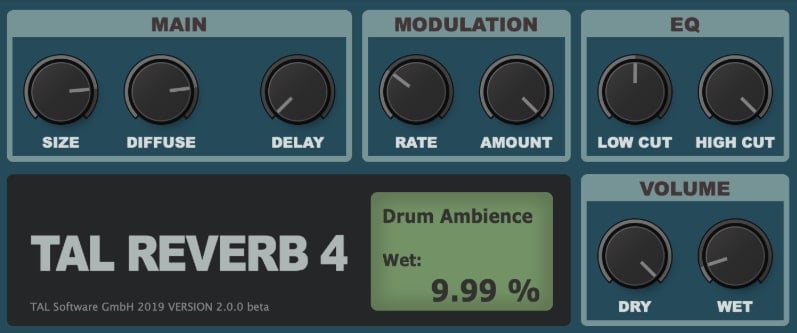
You may experience different types of reverb audio effects for different kinds of spaces. Basically, Reverb stands for Reverberation. It happens quite always in our daily life, but we hardly notice it.
For instance, Reverb at tunnels or caves is different from the reverb audio effect of cathedrals or halls.
Reverb audio effects can be generated digitally with the help of reverb plugins to create multiple echoes algorithmically and by manipulating the Delay, level, or frequency response.
Part 3: Audio effects - Panning
The panning audio effect is generally created to cast an illusion that the source of the sound is moving from one position of the stage to another. This is achieved by distributing the sound signal in a multichannel or a stereo field.
Panning audio effect is highly helpful when you need to avoid muddiness or masking (when two tracks/sounds overlap) in your mix. You can position the sound artificially to a specific area of your stereo field.
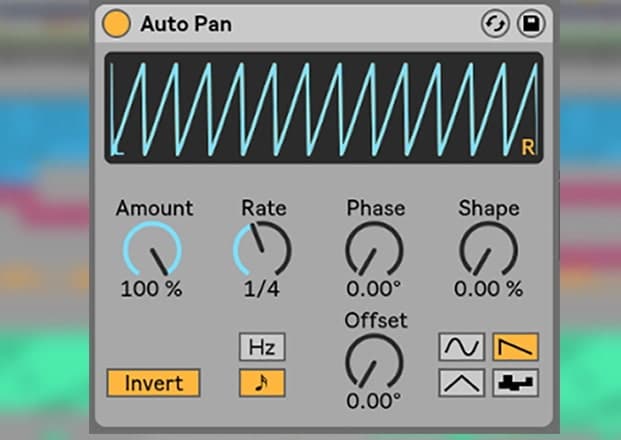
With the help of an auto-pan, you can define the time span during which the sound must sweep across the stereo field.
Usually, the lead elements like vocals or the low-frequency elements like bassline drums panned to the center. This is because the center is the busiest, and also these sound elements ground your mix.
Part 4: Audio effects - Equalization
The sound frequency that falls into the range from 20 to 20,000 Hz is the audible sound spectrum of human ears. With the EQ technique, this spectrum is split into different sections referred to as bands.
These bands are then used to subdue or enhance a mixed track’s fragments.
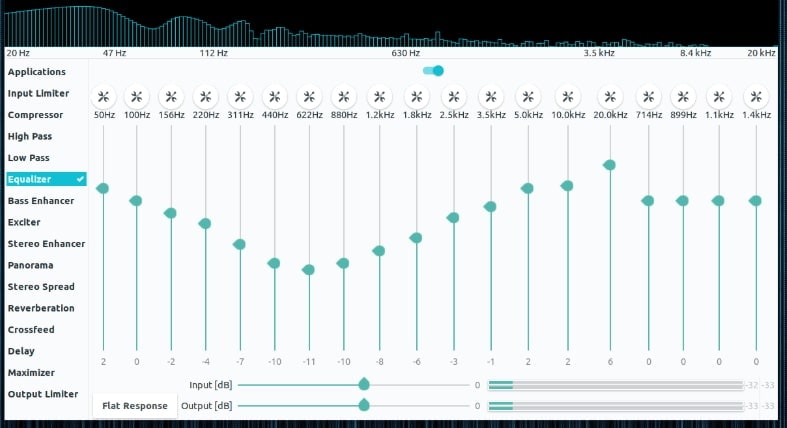
Remember, EQ-ing works on the existing spectrum only by altering the fragments to create novel-sounding effects. EQ audio effects are majorly used to define a character or tone of the soundtrack.
Moreover, you can define different types of sound characters with the help of different EQ audio effects. For instance, a digital plugin EQ is far more transparent sounding when compared to a vintage EQ.
Part 5: Audio effects - Delay and Echo
Delay is yet another type of audio effect that falls under the Time-based category. Adding layers can significantly provide more complexity and depth to a soundtrack.
The foundation to add Reverb or chorus-like other audio effects is furnished by Delay. Hence, it is prominently utilized by several mixing engineers.
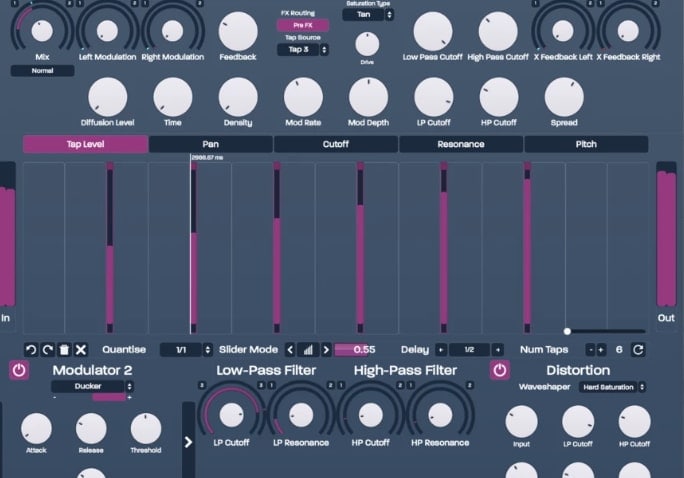
The echo also falls under the time-based audio effect, which is developed due to the Delay audio effect. An echoing effect is simulated at various intervals when Delay audio effect features playback heads or “taps” that are heard apart.
If you want to edit audios like a pro, you should use Filmora . It is the best video editor for different users. You can add echo to audio by directly dragging the effect onto the timeline. Download it now to have a try (Free)!
Part 6: Audio effects - Distortion
When an audio circuit is overloaded, it ultimately leads to a clip the signal is termed as Distortion.
This audio effect can be a highly creative tool if used correctly. Distortion pushes the sound to compress and clip by manipulating the original audio signal.
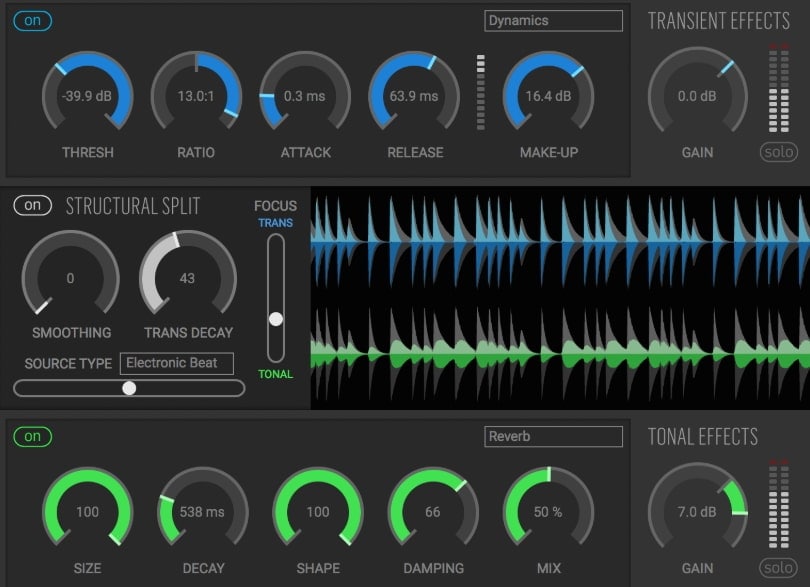
By manipulating the bit rate or the sampling rate, Bit-crushing is achieved. This, eventually, adds harmony to the sound.
Usually, the electric guitars make use of Distortion audio effect but more progressively it is being used over Synths.
Distortion can be acquired using effects units, rackmounts, pedals, VSTs, or at times, built-in amplifiers and pre-amps. Distortion adds complexity and body to your track by making it fatter and fuller.
Part 7: Audio effects - Chorus
Chorus audio effect is referred to the varying sounds that are similar and are heard as one.
For instance, recording the same note piled over each other and is timed and tuned slightly off each other.
This as a whole, creates a chorus effect. In simple words, a group of singers is voicing a song while creating a special sound effect.
The chorus, too, adds complexity and depth to your soundtracks. It is generally used to enhance the harmony or load up the particular track, making the track fuller and layered.
Part 8: Audio effects - Filters
An audio signal’s frequency range can be altered using the Audio filters. With the help of an audio filter, you can easily amplify or boost the frequency range.
Or, can even cut or attenuate a frequency range too. When it comes to categorizing the Audio Filters, they fall under 3 units; HPF (High-pass filters), LPF (Low-pass filters), BPF (Band-pass filters).

Every other filter has a well-defined threshold for boosting or cutting a frequency. They are then categorized depending on the alterations that have been made above or below this threshold.
An Audio filter is a prominent tool used to correct problems and significantly enhance tracks. You can effectively make dramatic effects or add character to the soundtrack with filters.
Conclusion
With this comprehensive discussion on audio effects and various core types of audio effects, it’s now time to conclude this topic. We now believe you have a full understanding of these core audio effects and can effectively use them as per your needs.

Benjamin Arango
Benjamin Arango is a writer and a lover of all things video.
Follow @Benjamin Arango
Benjamin Arango
Mar 27, 2024• Proven solutions
When it comes to producing music, audio effects are a next-level creative tool that you can make use of to create highly enthralling and creative music/videos.
You can either create audio effects of your own or make use of a predefined royalty-free audio effects template (if you don’t wish to invest, as a beginner).
Audio effects have the power to transform any so-so music into a superior finished track.
For this reason, we’ve specifically tailored this post to help you understand the insights of audio effects. Moreover, we’re also going to get familiar with 7 audio effects that must be known! So, let’s not delay any further and start exploring.
- Part 1: The Definition of Audio Effects
- Part 2: Audio effects - Reverb
- Part 3: Audio effects - Panning
- Part 4: Audio effects - Equalization
- Part 5: Audio effects - Delay and Echo
- Part 6: Audio effects - Distortion
- Part 7: Audio effects - Chorus
- Part 8: Audio effects - Filters
Part 1: The Definition of Audio Effects
Before we get our hands on the different core types of audio effects, we should first understand what audio effects are!
Basically, the audio effects are generated by software or hardware devices by manipulating how an audio signal sounds. One can control the Effects with the help of several parameters.
For instance, rate, drive, or feedback. They come in handy as studio tools during the mixing or recording of music or while playing live.
Here are some core types of audio effects we will discover further in the article.
- Time-based effects include “Reverb” and “Delay and Echo.”
- Spectral effects include the “Equalization (EQ)” and “Panning.”
- Dynamic effects include “Distortion.”
- Modulation effects include “Chorus.”
- And “Filters.”
Part 2: Audio effects - Reverb
Reverb is nothing but an audio effect of many echoes occurring simultaneously.
In other words, sound reaches your ears in two ways. One that directly reaches your eardrums without any obstacles or surfaces.
And the other, a bunch of sound waves that reach your ears after getting bounced off different surfaces. This set of echoes reach your eardrums later and is quieter (due to lesser energy).

You may experience different types of reverb audio effects for different kinds of spaces. Basically, Reverb stands for Reverberation. It happens quite always in our daily life, but we hardly notice it.
For instance, Reverb at tunnels or caves is different from the reverb audio effect of cathedrals or halls.
Reverb audio effects can be generated digitally with the help of reverb plugins to create multiple echoes algorithmically and by manipulating the Delay, level, or frequency response.
Part 3: Audio effects - Panning
The panning audio effect is generally created to cast an illusion that the source of the sound is moving from one position of the stage to another. This is achieved by distributing the sound signal in a multichannel or a stereo field.
Panning audio effect is highly helpful when you need to avoid muddiness or masking (when two tracks/sounds overlap) in your mix. You can position the sound artificially to a specific area of your stereo field.

With the help of an auto-pan, you can define the time span during which the sound must sweep across the stereo field.
Usually, the lead elements like vocals or the low-frequency elements like bassline drums panned to the center. This is because the center is the busiest, and also these sound elements ground your mix.
Part 4: Audio effects - Equalization
The sound frequency that falls into the range from 20 to 20,000 Hz is the audible sound spectrum of human ears. With the EQ technique, this spectrum is split into different sections referred to as bands.
These bands are then used to subdue or enhance a mixed track’s fragments.

Remember, EQ-ing works on the existing spectrum only by altering the fragments to create novel-sounding effects. EQ audio effects are majorly used to define a character or tone of the soundtrack.
Moreover, you can define different types of sound characters with the help of different EQ audio effects. For instance, a digital plugin EQ is far more transparent sounding when compared to a vintage EQ.
Part 5: Audio effects - Delay and Echo
Delay is yet another type of audio effect that falls under the Time-based category. Adding layers can significantly provide more complexity and depth to a soundtrack.
The foundation to add Reverb or chorus-like other audio effects is furnished by Delay. Hence, it is prominently utilized by several mixing engineers.

The echo also falls under the time-based audio effect, which is developed due to the Delay audio effect. An echoing effect is simulated at various intervals when Delay audio effect features playback heads or “taps” that are heard apart.
If you want to edit audios like a pro, you should use Filmora . It is the best video editor for different users. You can add echo to audio by directly dragging the effect onto the timeline. Download it now to have a try (Free)!
Part 6: Audio effects - Distortion
When an audio circuit is overloaded, it ultimately leads to a clip the signal is termed as Distortion.
This audio effect can be a highly creative tool if used correctly. Distortion pushes the sound to compress and clip by manipulating the original audio signal.

By manipulating the bit rate or the sampling rate, Bit-crushing is achieved. This, eventually, adds harmony to the sound.
Usually, the electric guitars make use of Distortion audio effect but more progressively it is being used over Synths.
Distortion can be acquired using effects units, rackmounts, pedals, VSTs, or at times, built-in amplifiers and pre-amps. Distortion adds complexity and body to your track by making it fatter and fuller.
Part 7: Audio effects - Chorus
Chorus audio effect is referred to the varying sounds that are similar and are heard as one.
For instance, recording the same note piled over each other and is timed and tuned slightly off each other.
This as a whole, creates a chorus effect. In simple words, a group of singers is voicing a song while creating a special sound effect.
The chorus, too, adds complexity and depth to your soundtracks. It is generally used to enhance the harmony or load up the particular track, making the track fuller and layered.
Part 8: Audio effects - Filters
An audio signal’s frequency range can be altered using the Audio filters. With the help of an audio filter, you can easily amplify or boost the frequency range.
Or, can even cut or attenuate a frequency range too. When it comes to categorizing the Audio Filters, they fall under 3 units; HPF (High-pass filters), LPF (Low-pass filters), BPF (Band-pass filters).

Every other filter has a well-defined threshold for boosting or cutting a frequency. They are then categorized depending on the alterations that have been made above or below this threshold.
An Audio filter is a prominent tool used to correct problems and significantly enhance tracks. You can effectively make dramatic effects or add character to the soundtrack with filters.
Conclusion
With this comprehensive discussion on audio effects and various core types of audio effects, it’s now time to conclude this topic. We now believe you have a full understanding of these core audio effects and can effectively use them as per your needs.

Benjamin Arango
Benjamin Arango is a writer and a lover of all things video.
Follow @Benjamin Arango
Benjamin Arango
Mar 27, 2024• Proven solutions
When it comes to producing music, audio effects are a next-level creative tool that you can make use of to create highly enthralling and creative music/videos.
You can either create audio effects of your own or make use of a predefined royalty-free audio effects template (if you don’t wish to invest, as a beginner).
Audio effects have the power to transform any so-so music into a superior finished track.
For this reason, we’ve specifically tailored this post to help you understand the insights of audio effects. Moreover, we’re also going to get familiar with 7 audio effects that must be known! So, let’s not delay any further and start exploring.
- Part 1: The Definition of Audio Effects
- Part 2: Audio effects - Reverb
- Part 3: Audio effects - Panning
- Part 4: Audio effects - Equalization
- Part 5: Audio effects - Delay and Echo
- Part 6: Audio effects - Distortion
- Part 7: Audio effects - Chorus
- Part 8: Audio effects - Filters
Part 1: The Definition of Audio Effects
Before we get our hands on the different core types of audio effects, we should first understand what audio effects are!
Basically, the audio effects are generated by software or hardware devices by manipulating how an audio signal sounds. One can control the Effects with the help of several parameters.
For instance, rate, drive, or feedback. They come in handy as studio tools during the mixing or recording of music or while playing live.
Here are some core types of audio effects we will discover further in the article.
- Time-based effects include “Reverb” and “Delay and Echo.”
- Spectral effects include the “Equalization (EQ)” and “Panning.”
- Dynamic effects include “Distortion.”
- Modulation effects include “Chorus.”
- And “Filters.”
Part 2: Audio effects - Reverb
Reverb is nothing but an audio effect of many echoes occurring simultaneously.
In other words, sound reaches your ears in two ways. One that directly reaches your eardrums without any obstacles or surfaces.
And the other, a bunch of sound waves that reach your ears after getting bounced off different surfaces. This set of echoes reach your eardrums later and is quieter (due to lesser energy).

You may experience different types of reverb audio effects for different kinds of spaces. Basically, Reverb stands for Reverberation. It happens quite always in our daily life, but we hardly notice it.
For instance, Reverb at tunnels or caves is different from the reverb audio effect of cathedrals or halls.
Reverb audio effects can be generated digitally with the help of reverb plugins to create multiple echoes algorithmically and by manipulating the Delay, level, or frequency response.
Part 3: Audio effects - Panning
The panning audio effect is generally created to cast an illusion that the source of the sound is moving from one position of the stage to another. This is achieved by distributing the sound signal in a multichannel or a stereo field.
Panning audio effect is highly helpful when you need to avoid muddiness or masking (when two tracks/sounds overlap) in your mix. You can position the sound artificially to a specific area of your stereo field.

With the help of an auto-pan, you can define the time span during which the sound must sweep across the stereo field.
Usually, the lead elements like vocals or the low-frequency elements like bassline drums panned to the center. This is because the center is the busiest, and also these sound elements ground your mix.
Part 4: Audio effects - Equalization
The sound frequency that falls into the range from 20 to 20,000 Hz is the audible sound spectrum of human ears. With the EQ technique, this spectrum is split into different sections referred to as bands.
These bands are then used to subdue or enhance a mixed track’s fragments.

Remember, EQ-ing works on the existing spectrum only by altering the fragments to create novel-sounding effects. EQ audio effects are majorly used to define a character or tone of the soundtrack.
Moreover, you can define different types of sound characters with the help of different EQ audio effects. For instance, a digital plugin EQ is far more transparent sounding when compared to a vintage EQ.
Part 5: Audio effects - Delay and Echo
Delay is yet another type of audio effect that falls under the Time-based category. Adding layers can significantly provide more complexity and depth to a soundtrack.
The foundation to add Reverb or chorus-like other audio effects is furnished by Delay. Hence, it is prominently utilized by several mixing engineers.

The echo also falls under the time-based audio effect, which is developed due to the Delay audio effect. An echoing effect is simulated at various intervals when Delay audio effect features playback heads or “taps” that are heard apart.
If you want to edit audios like a pro, you should use Filmora . It is the best video editor for different users. You can add echo to audio by directly dragging the effect onto the timeline. Download it now to have a try (Free)!
Part 6: Audio effects - Distortion
When an audio circuit is overloaded, it ultimately leads to a clip the signal is termed as Distortion.
This audio effect can be a highly creative tool if used correctly. Distortion pushes the sound to compress and clip by manipulating the original audio signal.

By manipulating the bit rate or the sampling rate, Bit-crushing is achieved. This, eventually, adds harmony to the sound.
Usually, the electric guitars make use of Distortion audio effect but more progressively it is being used over Synths.
Distortion can be acquired using effects units, rackmounts, pedals, VSTs, or at times, built-in amplifiers and pre-amps. Distortion adds complexity and body to your track by making it fatter and fuller.
Part 7: Audio effects - Chorus
Chorus audio effect is referred to the varying sounds that are similar and are heard as one.
For instance, recording the same note piled over each other and is timed and tuned slightly off each other.
This as a whole, creates a chorus effect. In simple words, a group of singers is voicing a song while creating a special sound effect.
The chorus, too, adds complexity and depth to your soundtracks. It is generally used to enhance the harmony or load up the particular track, making the track fuller and layered.
Part 8: Audio effects - Filters
An audio signal’s frequency range can be altered using the Audio filters. With the help of an audio filter, you can easily amplify or boost the frequency range.
Or, can even cut or attenuate a frequency range too. When it comes to categorizing the Audio Filters, they fall under 3 units; HPF (High-pass filters), LPF (Low-pass filters), BPF (Band-pass filters).

Every other filter has a well-defined threshold for boosting or cutting a frequency. They are then categorized depending on the alterations that have been made above or below this threshold.
An Audio filter is a prominent tool used to correct problems and significantly enhance tracks. You can effectively make dramatic effects or add character to the soundtrack with filters.
Conclusion
With this comprehensive discussion on audio effects and various core types of audio effects, it’s now time to conclude this topic. We now believe you have a full understanding of these core audio effects and can effectively use them as per your needs.

Benjamin Arango
Benjamin Arango is a writer and a lover of all things video.
Follow @Benjamin Arango
Benjamin Arango
Mar 27, 2024• Proven solutions
When it comes to producing music, audio effects are a next-level creative tool that you can make use of to create highly enthralling and creative music/videos.
You can either create audio effects of your own or make use of a predefined royalty-free audio effects template (if you don’t wish to invest, as a beginner).
Audio effects have the power to transform any so-so music into a superior finished track.
For this reason, we’ve specifically tailored this post to help you understand the insights of audio effects. Moreover, we’re also going to get familiar with 7 audio effects that must be known! So, let’s not delay any further and start exploring.
- Part 1: The Definition of Audio Effects
- Part 2: Audio effects - Reverb
- Part 3: Audio effects - Panning
- Part 4: Audio effects - Equalization
- Part 5: Audio effects - Delay and Echo
- Part 6: Audio effects - Distortion
- Part 7: Audio effects - Chorus
- Part 8: Audio effects - Filters
Part 1: The Definition of Audio Effects
Before we get our hands on the different core types of audio effects, we should first understand what audio effects are!
Basically, the audio effects are generated by software or hardware devices by manipulating how an audio signal sounds. One can control the Effects with the help of several parameters.
For instance, rate, drive, or feedback. They come in handy as studio tools during the mixing or recording of music or while playing live.
Here are some core types of audio effects we will discover further in the article.
- Time-based effects include “Reverb” and “Delay and Echo.”
- Spectral effects include the “Equalization (EQ)” and “Panning.”
- Dynamic effects include “Distortion.”
- Modulation effects include “Chorus.”
- And “Filters.”
Part 2: Audio effects - Reverb
Reverb is nothing but an audio effect of many echoes occurring simultaneously.
In other words, sound reaches your ears in two ways. One that directly reaches your eardrums without any obstacles or surfaces.
And the other, a bunch of sound waves that reach your ears after getting bounced off different surfaces. This set of echoes reach your eardrums later and is quieter (due to lesser energy).

You may experience different types of reverb audio effects for different kinds of spaces. Basically, Reverb stands for Reverberation. It happens quite always in our daily life, but we hardly notice it.
For instance, Reverb at tunnels or caves is different from the reverb audio effect of cathedrals or halls.
Reverb audio effects can be generated digitally with the help of reverb plugins to create multiple echoes algorithmically and by manipulating the Delay, level, or frequency response.
Part 3: Audio effects - Panning
The panning audio effect is generally created to cast an illusion that the source of the sound is moving from one position of the stage to another. This is achieved by distributing the sound signal in a multichannel or a stereo field.
Panning audio effect is highly helpful when you need to avoid muddiness or masking (when two tracks/sounds overlap) in your mix. You can position the sound artificially to a specific area of your stereo field.

With the help of an auto-pan, you can define the time span during which the sound must sweep across the stereo field.
Usually, the lead elements like vocals or the low-frequency elements like bassline drums panned to the center. This is because the center is the busiest, and also these sound elements ground your mix.
Part 4: Audio effects - Equalization
The sound frequency that falls into the range from 20 to 20,000 Hz is the audible sound spectrum of human ears. With the EQ technique, this spectrum is split into different sections referred to as bands.
These bands are then used to subdue or enhance a mixed track’s fragments.

Remember, EQ-ing works on the existing spectrum only by altering the fragments to create novel-sounding effects. EQ audio effects are majorly used to define a character or tone of the soundtrack.
Moreover, you can define different types of sound characters with the help of different EQ audio effects. For instance, a digital plugin EQ is far more transparent sounding when compared to a vintage EQ.
Part 5: Audio effects - Delay and Echo
Delay is yet another type of audio effect that falls under the Time-based category. Adding layers can significantly provide more complexity and depth to a soundtrack.
The foundation to add Reverb or chorus-like other audio effects is furnished by Delay. Hence, it is prominently utilized by several mixing engineers.

The echo also falls under the time-based audio effect, which is developed due to the Delay audio effect. An echoing effect is simulated at various intervals when Delay audio effect features playback heads or “taps” that are heard apart.
If you want to edit audios like a pro, you should use Filmora . It is the best video editor for different users. You can add echo to audio by directly dragging the effect onto the timeline. Download it now to have a try (Free)!
Part 6: Audio effects - Distortion
When an audio circuit is overloaded, it ultimately leads to a clip the signal is termed as Distortion.
This audio effect can be a highly creative tool if used correctly. Distortion pushes the sound to compress and clip by manipulating the original audio signal.

By manipulating the bit rate or the sampling rate, Bit-crushing is achieved. This, eventually, adds harmony to the sound.
Usually, the electric guitars make use of Distortion audio effect but more progressively it is being used over Synths.
Distortion can be acquired using effects units, rackmounts, pedals, VSTs, or at times, built-in amplifiers and pre-amps. Distortion adds complexity and body to your track by making it fatter and fuller.
Part 7: Audio effects - Chorus
Chorus audio effect is referred to the varying sounds that are similar and are heard as one.
For instance, recording the same note piled over each other and is timed and tuned slightly off each other.
This as a whole, creates a chorus effect. In simple words, a group of singers is voicing a song while creating a special sound effect.
The chorus, too, adds complexity and depth to your soundtracks. It is generally used to enhance the harmony or load up the particular track, making the track fuller and layered.
Part 8: Audio effects - Filters
An audio signal’s frequency range can be altered using the Audio filters. With the help of an audio filter, you can easily amplify or boost the frequency range.
Or, can even cut or attenuate a frequency range too. When it comes to categorizing the Audio Filters, they fall under 3 units; HPF (High-pass filters), LPF (Low-pass filters), BPF (Band-pass filters).

Every other filter has a well-defined threshold for boosting or cutting a frequency. They are then categorized depending on the alterations that have been made above or below this threshold.
An Audio filter is a prominent tool used to correct problems and significantly enhance tracks. You can effectively make dramatic effects or add character to the soundtrack with filters.
Conclusion
With this comprehensive discussion on audio effects and various core types of audio effects, it’s now time to conclude this topic. We now believe you have a full understanding of these core audio effects and can effectively use them as per your needs.

Benjamin Arango
Benjamin Arango is a writer and a lover of all things video.
Follow @Benjamin Arango
Online Audio Enhancement: A Step-by-Step Guide to Adjusting Speed & Pitch
If you have downloaded an audio story and you find out that the audio speed is rather slow which is making it sound boring, you can change the speed without downloading any software. Similarly, you downloaded a podcast where the speaker is speaking fast and you need to slow down the speed. That is where an audio speed changer online where you can change speed of any audio file easily.
When you change the speed, the pitch of the audio also changes simultaneously. Therefore, most audio speed changing tools are actually speed and pitch changers. However, there are certain audio speed changing tools where you can change speed without changing pitch. Apart from the online audio speed and pitcher charger tools, we have also provided you an audio speed changer software for your requirements.
1. Music Speed Changer
Music Speed Changer is an audio speed and pitch changer that lets you change speed as well as pitch independently. The user interface is quite appealing and you can make the changes and play the audio to check the changes. You can set a loop between any two points on the audio spectrum. Here are the key features of Music Speed Changer.
- Change speed(tempo) and pitch independently.
- Intuitive controls and save changes instantly.
- Make a loop by marking specific points.
- Listen to the changes instantly.
How to change audio speed and pitch with Music Speed Changer?
Step 1. Visit https://app.musicspeedchanger.com on your browser.
Step 2. Click on ‘Choose Audio File’ button to select your audio file.
Step 3. Use the sliders for changing speed(tempo) and pitch accordingly.
Step 4. Play the audio to check the changes and click on Save icon for downloading the modified audio file.

2. Audio Alter
If you have an audio file with an unusual file format such as WAC or OGG, Audio Alter has the best set of audio tools. If you want to change speed, you have to choose Tempo changer. If you want to change pitch, you have to choose audio pitch changer. Besides, there are other useful tools such as equalizer, volume changer, noise reducer and much more. Along with MP3 audio files, you can change speed for WAV, FLAC, OGG audio files. Here are the key features of Audio Alter.
- Individual tools for changing speed and pitch.
- Drag and drop audio file as well as browser from hard drive.
- Supports MP3, WAV, FLAC, OGG audio file formats.
- Live listen to the changes in the audio.
How to change audio speed or pitch with Audio Alter?
Step 1. Visit “audioalter.com/tempo” to change speed or “audioalter.com/pitch-shifter“ to change pitch on your web browser.
Step 2. Click on Browse computer button and select the audio file. Otherwise, drag and drop the audio file directly.
Step 3. Use the slider, you can change the speed or pitch.
Step 4. You can turn on the checkbox “Preserve Pitch” to change audio speed without changing pitch.
Step 5. You can play and check the changes and finally, click on Submit button to process the audio file.

3. Audio Speed Changer
Audio Speed Changer is one of the most popular audio pitch changer online as well as speed changer online tools. There are different sources from which you can upload audio files starting from your hard drive and cloud storage to websites through URLs. You can change speed by percentage as well as change pitch by semitones. Audio Speed Changer is also available as an app and you can opt for Audio Speed Changer Pro for added features. Here are the key features of Audio Speed Changer.
- Change the pitch and speed independently.
- Better processing via time-based and frequency-based methods.
- Save the modified audio file in MP3 or MA4 format.
- Step-by-step interface enables hassle-free operation.
How to change audio speed with Audio Speed Changer?
Step 1. Visit “www.audiospeedchanger.com” from the web browser.
Step 2. Click on Choose File button and select the audio file. If you want to refer to any website’s audio file, you can mention the URL as well.
Step 3. Change pitch and speed as per requirements.
Step 4. Select MP3 and M4A file format to save as the output file.
Step 5. Select the processing method and click on Convert Now button.

Bonus: Change Audio Speed With A Professional Software
If you are looking for a professional editor to tweak the speed, pitch, as well as various other audio properties, we recommend Wondershare Filmora. It is a video editor with inbuilt audio editor. You can even record video and audio on the software and you can trim out useless audio parts as well as sync audio with video perfectly. Most importantly, you can import and export audio files in different file formats. Here are the steps to change audio speed with Filmora.
For Win 7 or later (64-bit)
For macOS 10.12 or later
Step 1: Download and install Wondershare Filmora.
Step 2: Go to File menu and then go Import Media and select Import Media Files option.
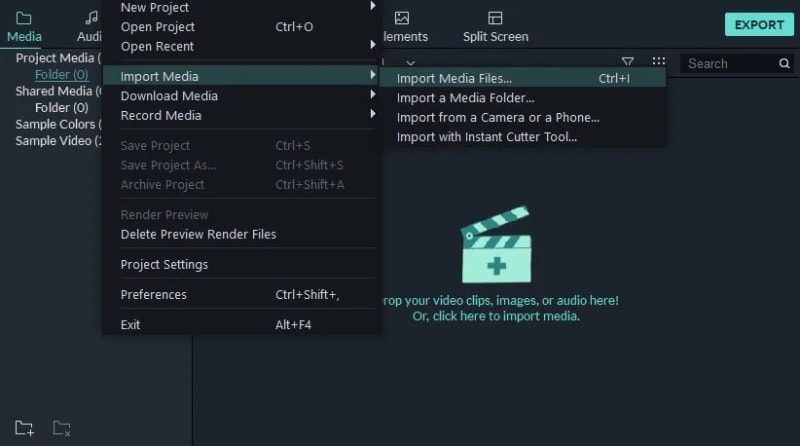
Step 3: Import the audio file from your hard drive and it will appear under Project Media folder on Filmora. You need to drag and drop the audio file on audio timeline.
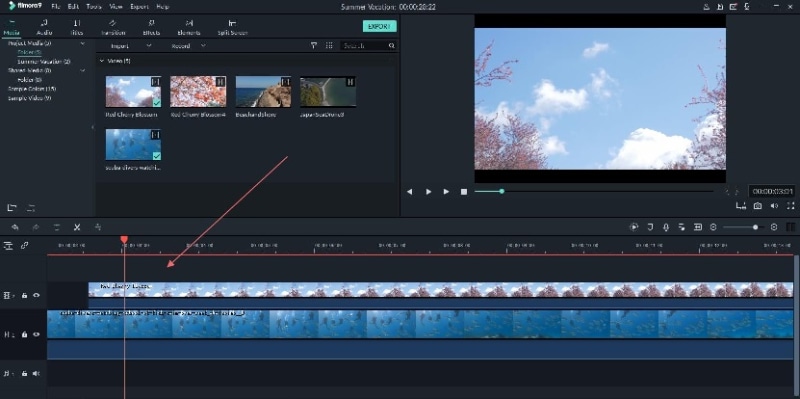
Step 4: Click on Speedometer icon and select the preset speed.

Step 5: If you want a custom speed, click on Custom Speed and set speed according to your requirements.

Step 6: Play the audio file to get satisfied with the changes, click on Export to save the file in preferred file format.
Conclusion
Change audio speed generally changes the pitch of the audio. However, you may want to change speed and pitch separately and independently. That is why we have selected the best audio speed and pitch changers where you can adjust the parameters as per your requirements. You can use these online tools on computer as well as smartphone. We have also recommended Wondershare Filmora for professional audio editing of various audio parameters.
How to change audio speed and pitch with Music Speed Changer?
Step 1. Visit https://app.musicspeedchanger.com on your browser.
Step 2. Click on ‘Choose Audio File’ button to select your audio file.
Step 3. Use the sliders for changing speed(tempo) and pitch accordingly.
Step 4. Play the audio to check the changes and click on Save icon for downloading the modified audio file.

2. Audio Alter
If you have an audio file with an unusual file format such as WAC or OGG, Audio Alter has the best set of audio tools. If you want to change speed, you have to choose Tempo changer. If you want to change pitch, you have to choose audio pitch changer. Besides, there are other useful tools such as equalizer, volume changer, noise reducer and much more. Along with MP3 audio files, you can change speed for WAV, FLAC, OGG audio files. Here are the key features of Audio Alter.
- Individual tools for changing speed and pitch.
- Drag and drop audio file as well as browser from hard drive.
- Supports MP3, WAV, FLAC, OGG audio file formats.
- Live listen to the changes in the audio.
How to change audio speed or pitch with Audio Alter?
Step 1. Visit “audioalter.com/tempo” to change speed or “audioalter.com/pitch-shifter“ to change pitch on your web browser.
Step 2. Click on Browse computer button and select the audio file. Otherwise, drag and drop the audio file directly.
Step 3. Use the slider, you can change the speed or pitch.
Step 4. You can turn on the checkbox “Preserve Pitch” to change audio speed without changing pitch.
Step 5. You can play and check the changes and finally, click on Submit button to process the audio file.

3. Audio Speed Changer
Audio Speed Changer is one of the most popular audio pitch changer online as well as speed changer online tools. There are different sources from which you can upload audio files starting from your hard drive and cloud storage to websites through URLs. You can change speed by percentage as well as change pitch by semitones. Audio Speed Changer is also available as an app and you can opt for Audio Speed Changer Pro for added features. Here are the key features of Audio Speed Changer.
- Change the pitch and speed independently.
- Better processing via time-based and frequency-based methods.
- Save the modified audio file in MP3 or MA4 format.
- Step-by-step interface enables hassle-free operation.
How to change audio speed with Audio Speed Changer?
Step 1. Visit “www.audiospeedchanger.com” from the web browser.
Step 2. Click on Choose File button and select the audio file. If you want to refer to any website’s audio file, you can mention the URL as well.
Step 3. Change pitch and speed as per requirements.
Step 4. Select MP3 and M4A file format to save as the output file.
Step 5. Select the processing method and click on Convert Now button.

Bonus: Change Audio Speed With A Professional Software
If you are looking for a professional editor to tweak the speed, pitch, as well as various other audio properties, we recommend Wondershare Filmora. It is a video editor with inbuilt audio editor. You can even record video and audio on the software and you can trim out useless audio parts as well as sync audio with video perfectly. Most importantly, you can import and export audio files in different file formats. Here are the steps to change audio speed with Filmora.
For Win 7 or later (64-bit)
For macOS 10.12 or later
Step 1: Download and install Wondershare Filmora.
Step 2: Go to File menu and then go Import Media and select Import Media Files option.

Step 3: Import the audio file from your hard drive and it will appear under Project Media folder on Filmora. You need to drag and drop the audio file on audio timeline.

Step 4: Click on Speedometer icon and select the preset speed.

Step 5: If you want a custom speed, click on Custom Speed and set speed according to your requirements.

Step 6: Play the audio file to get satisfied with the changes, click on Export to save the file in preferred file format.
Conclusion
Change audio speed generally changes the pitch of the audio. However, you may want to change speed and pitch separately and independently. That is why we have selected the best audio speed and pitch changers where you can adjust the parameters as per your requirements. You can use these online tools on computer as well as smartphone. We have also recommended Wondershare Filmora for professional audio editing of various audio parameters.
How to change audio speed and pitch with Music Speed Changer?
Step 1. Visit https://app.musicspeedchanger.com on your browser.
Step 2. Click on ‘Choose Audio File’ button to select your audio file.
Step 3. Use the sliders for changing speed(tempo) and pitch accordingly.
Step 4. Play the audio to check the changes and click on Save icon for downloading the modified audio file.

2. Audio Alter
If you have an audio file with an unusual file format such as WAC or OGG, Audio Alter has the best set of audio tools. If you want to change speed, you have to choose Tempo changer. If you want to change pitch, you have to choose audio pitch changer. Besides, there are other useful tools such as equalizer, volume changer, noise reducer and much more. Along with MP3 audio files, you can change speed for WAV, FLAC, OGG audio files. Here are the key features of Audio Alter.
- Individual tools for changing speed and pitch.
- Drag and drop audio file as well as browser from hard drive.
- Supports MP3, WAV, FLAC, OGG audio file formats.
- Live listen to the changes in the audio.
How to change audio speed or pitch with Audio Alter?
Step 1. Visit “audioalter.com/tempo” to change speed or “audioalter.com/pitch-shifter“ to change pitch on your web browser.
Step 2. Click on Browse computer button and select the audio file. Otherwise, drag and drop the audio file directly.
Step 3. Use the slider, you can change the speed or pitch.
Step 4. You can turn on the checkbox “Preserve Pitch” to change audio speed without changing pitch.
Step 5. You can play and check the changes and finally, click on Submit button to process the audio file.

3. Audio Speed Changer
Audio Speed Changer is one of the most popular audio pitch changer online as well as speed changer online tools. There are different sources from which you can upload audio files starting from your hard drive and cloud storage to websites through URLs. You can change speed by percentage as well as change pitch by semitones. Audio Speed Changer is also available as an app and you can opt for Audio Speed Changer Pro for added features. Here are the key features of Audio Speed Changer.
- Change the pitch and speed independently.
- Better processing via time-based and frequency-based methods.
- Save the modified audio file in MP3 or MA4 format.
- Step-by-step interface enables hassle-free operation.
How to change audio speed with Audio Speed Changer?
Step 1. Visit “www.audiospeedchanger.com” from the web browser.
Step 2. Click on Choose File button and select the audio file. If you want to refer to any website’s audio file, you can mention the URL as well.
Step 3. Change pitch and speed as per requirements.
Step 4. Select MP3 and M4A file format to save as the output file.
Step 5. Select the processing method and click on Convert Now button.

Bonus: Change Audio Speed With A Professional Software
If you are looking for a professional editor to tweak the speed, pitch, as well as various other audio properties, we recommend Wondershare Filmora. It is a video editor with inbuilt audio editor. You can even record video and audio on the software and you can trim out useless audio parts as well as sync audio with video perfectly. Most importantly, you can import and export audio files in different file formats. Here are the steps to change audio speed with Filmora.
For Win 7 or later (64-bit)
For macOS 10.12 or later
Step 1: Download and install Wondershare Filmora.
Step 2: Go to File menu and then go Import Media and select Import Media Files option.

Step 3: Import the audio file from your hard drive and it will appear under Project Media folder on Filmora. You need to drag and drop the audio file on audio timeline.

Step 4: Click on Speedometer icon and select the preset speed.

Step 5: If you want a custom speed, click on Custom Speed and set speed according to your requirements.

Step 6: Play the audio file to get satisfied with the changes, click on Export to save the file in preferred file format.
Conclusion
Change audio speed generally changes the pitch of the audio. However, you may want to change speed and pitch separately and independently. That is why we have selected the best audio speed and pitch changers where you can adjust the parameters as per your requirements. You can use these online tools on computer as well as smartphone. We have also recommended Wondershare Filmora for professional audio editing of various audio parameters.
How to change audio speed and pitch with Music Speed Changer?
Step 1. Visit https://app.musicspeedchanger.com on your browser.
Step 2. Click on ‘Choose Audio File’ button to select your audio file.
Step 3. Use the sliders for changing speed(tempo) and pitch accordingly.
Step 4. Play the audio to check the changes and click on Save icon for downloading the modified audio file.

2. Audio Alter
If you have an audio file with an unusual file format such as WAC or OGG, Audio Alter has the best set of audio tools. If you want to change speed, you have to choose Tempo changer. If you want to change pitch, you have to choose audio pitch changer. Besides, there are other useful tools such as equalizer, volume changer, noise reducer and much more. Along with MP3 audio files, you can change speed for WAV, FLAC, OGG audio files. Here are the key features of Audio Alter.
- Individual tools for changing speed and pitch.
- Drag and drop audio file as well as browser from hard drive.
- Supports MP3, WAV, FLAC, OGG audio file formats.
- Live listen to the changes in the audio.
How to change audio speed or pitch with Audio Alter?
Step 1. Visit “audioalter.com/tempo” to change speed or “audioalter.com/pitch-shifter“ to change pitch on your web browser.
Step 2. Click on Browse computer button and select the audio file. Otherwise, drag and drop the audio file directly.
Step 3. Use the slider, you can change the speed or pitch.
Step 4. You can turn on the checkbox “Preserve Pitch” to change audio speed without changing pitch.
Step 5. You can play and check the changes and finally, click on Submit button to process the audio file.

3. Audio Speed Changer
Audio Speed Changer is one of the most popular audio pitch changer online as well as speed changer online tools. There are different sources from which you can upload audio files starting from your hard drive and cloud storage to websites through URLs. You can change speed by percentage as well as change pitch by semitones. Audio Speed Changer is also available as an app and you can opt for Audio Speed Changer Pro for added features. Here are the key features of Audio Speed Changer.
- Change the pitch and speed independently.
- Better processing via time-based and frequency-based methods.
- Save the modified audio file in MP3 or MA4 format.
- Step-by-step interface enables hassle-free operation.
How to change audio speed with Audio Speed Changer?
Step 1. Visit “www.audiospeedchanger.com” from the web browser.
Step 2. Click on Choose File button and select the audio file. If you want to refer to any website’s audio file, you can mention the URL as well.
Step 3. Change pitch and speed as per requirements.
Step 4. Select MP3 and M4A file format to save as the output file.
Step 5. Select the processing method and click on Convert Now button.

Bonus: Change Audio Speed With A Professional Software
If you are looking for a professional editor to tweak the speed, pitch, as well as various other audio properties, we recommend Wondershare Filmora. It is a video editor with inbuilt audio editor. You can even record video and audio on the software and you can trim out useless audio parts as well as sync audio with video perfectly. Most importantly, you can import and export audio files in different file formats. Here are the steps to change audio speed with Filmora.
For Win 7 or later (64-bit)
For macOS 10.12 or later
Step 1: Download and install Wondershare Filmora.
Step 2: Go to File menu and then go Import Media and select Import Media Files option.

Step 3: Import the audio file from your hard drive and it will appear under Project Media folder on Filmora. You need to drag and drop the audio file on audio timeline.

Step 4: Click on Speedometer icon and select the preset speed.

Step 5: If you want a custom speed, click on Custom Speed and set speed according to your requirements.

Step 6: Play the audio file to get satisfied with the changes, click on Export to save the file in preferred file format.
Conclusion
Change audio speed generally changes the pitch of the audio. However, you may want to change speed and pitch separately and independently. That is why we have selected the best audio speed and pitch changers where you can adjust the parameters as per your requirements. You can use these online tools on computer as well as smartphone. We have also recommended Wondershare Filmora for professional audio editing of various audio parameters.
Enhance Your Sound System: Explore the Best 5 Car Audio Mixers Compatible with Mac Computers
If you have ambitions to be a musician or would like to improve the quality of your music files, one of the best ways you can do this is with an MP3 music mixer. There are different music mixers, but finding one compatible with Mac can be difficult. Luckily for you, we know precisely where to look. In this article, you’ll find the best MP3 music mixers for Mac. Our list includes basic and professional-life music mixers to help you pick the best option for your experience level and needs. So, whether you want to knock together an excelling MP3 mix or you’re looking to make impressive music, check out the list below for the ideal MP3 music mixer for you.
Audacity
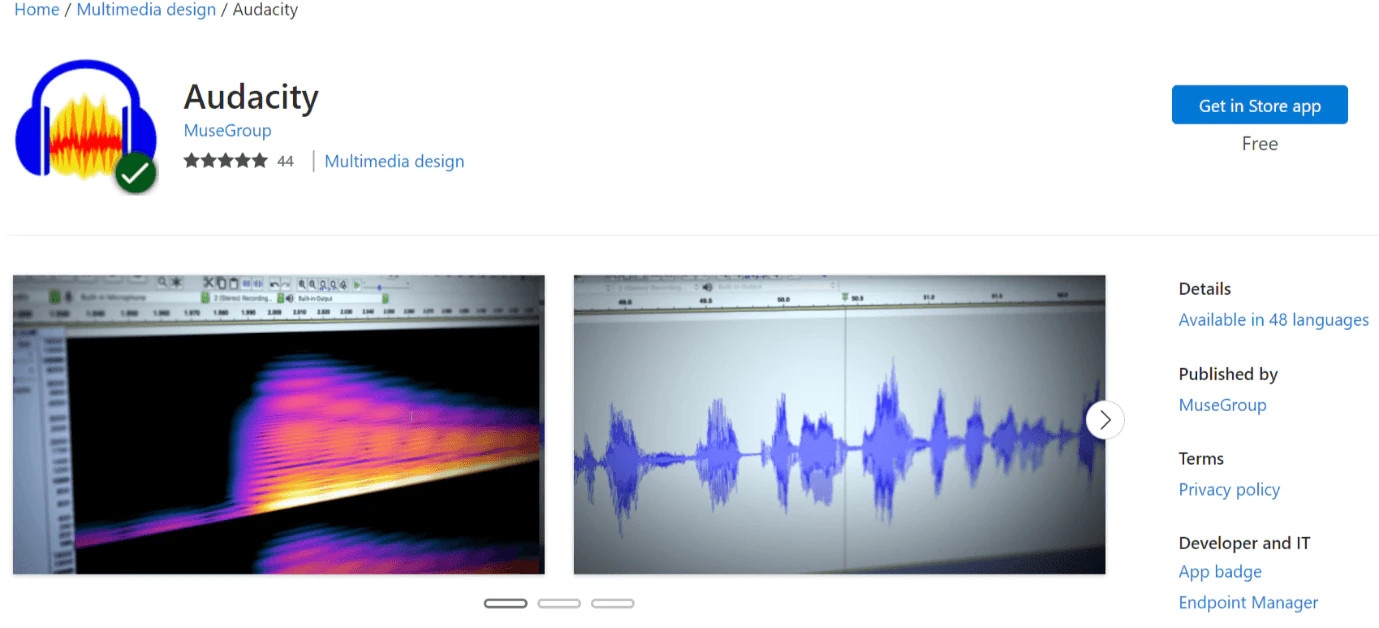
The first free MP3 music mixer for Mac that we have to consider is Audacity. Audacity is hard to miss because of how easy it is to use. Therefore, many people tend to recommend this software. Audacity is an open-sourced MP3 music mixer that’s entirely free to use. It has a straightforward and interactive user interface that supports the most popular file types, including MP3, WAV, OGG, MIDI, and many more.
With Audacity, you can record right in the app or edit existing files as you miss. It also comes with many effects that you can utilize to improve your MP3 file. Another unique tool on Audacity is the spectrogram that allows you to analyze the audio frequencies. Audacity supports up to 32-bit audio files making it a powerful MP3 music mixer for Mac users.
This MP3 music mixer is ideal for beginners as its features are easy to navigate. However, this doesn’t mean that professional DJs and sound producers cannot also utilize this audio mixer. You can record audio to add to your MP3 using a mixer or a live microphone. It also lets you download digital recordings from social media platforms like YouTube. This free MP3 music mixer for Mac is a great option to explore.
Pros
- It offers a spectrogram view to visualize frequencies
- It offers effects like Audio unity, which is specifically for Mac only
- Allows you to delete, cut, and merge clips
- It is entirely free to use
- Its keyboard shortcuts allow for a smooth workflow
Cons
- Crashes tend to happen
- It doesn’t support non-destructive editing
WavePad
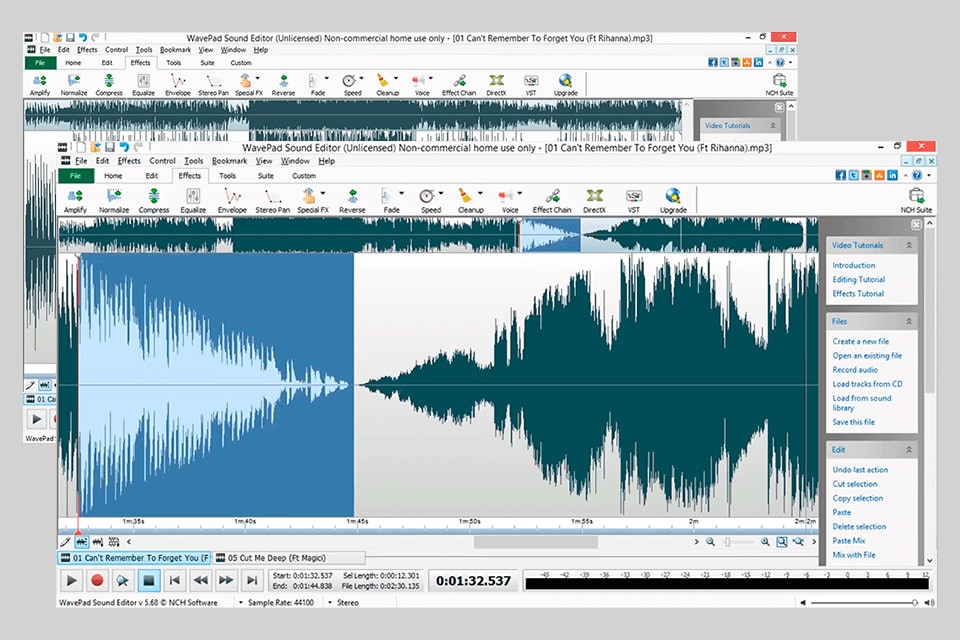
This is another impressive Mac MP3 music mixer you can use for free if you’re doing non-commercial mixing. WavePad is remarkable because it supports many file types, so there’s no need to convert your MP3 to another format before mixing on WavePad. It also supports users working on multiple files simultaneously. This means you can process thousands of files at the same time while editing a file. In addition, WavePad offers a vast range of effects and supports audio bookmarking, which you would find very useful.
Other features these mixer offers are voice manipulation and text-to-speech functions. It is quite easy to use, making it an excellent option for beginners. Some of the effects people seem to love on this MP3 music mixer is the compression, noise removal, reverb, and many more. There’s also the analysis tool that advanced users can utilize to mix and edit their MP3 files.
With WavePad, speed and pitch changes are entirely possible. It also supports audio scrubbing, which is very handy. However, this file doesn’t support multi-tracking. Therefore, users can edit stereo or mono audio files on the software. Although its multi-window interface can take a while to get used to, this Mac MP3 music mixer is worth a try.
Pros
- It is free for non-commercial use
- It comes with many impressive features
- Allows batch processing by users
- Supports common file types
Cons
- The interface can take some time to get used to
Ocenaudio
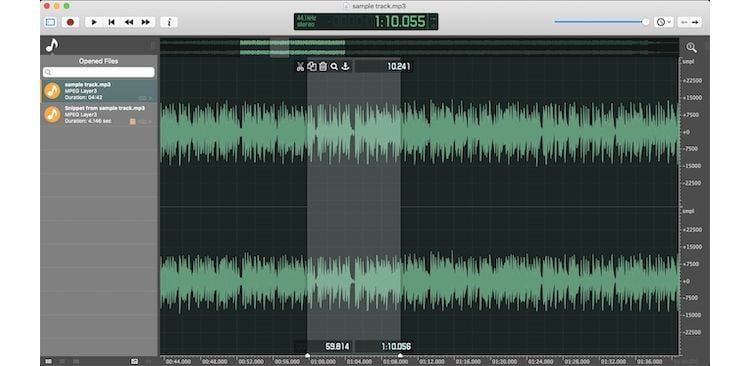
Another free cross-platform MP3 music mixer is another excellent option for your Mac devices. It is a great option if you’re looking for a budget-friendly option to edit and mix your MP3 files. This software supports many file types like MP3, WMA, FLAC, and many more. It also supports video formats if you also want to edit video files.
This MP3 music mixer comes with a clean and colorful user interface; it is easy to use and fast for mixing your MP3 files. WavePad has many effects like EQ, compression, and reverb, allowing you to tweak your MP3 files while mixing your music files. Unlike other MP3 mixers that are destructive when you are trying to edit the MP3 music file, this is not the case with Ocenaudio. With this software, you can tweak the parameters of the effect and hear the changes immediately.
Ocenaudio also supports VST; you can add your plugins when editing MP3 files. In addition, you can record audio straight in the software and use the spectrogram feature to visualize frequencies for advanced users. Professional music mixers would find this feature to be very welcoming.
Although it doesn’t support multi-track sessions, which means you can’t record several instruments and mix them, it is an excellent option for your mono file mixing. It is also quite simple to use compared to other basic MP3 music mixers for Mac.
Pros
- It offers the spectrogram feature
- It is free to use
- Users can install their plugins
- Ocenaudio offers non-destructive music editing
Cons
- It doesn’t support multi-track sessions
- Not ideal for professionals
PreSonus Studio One Prime
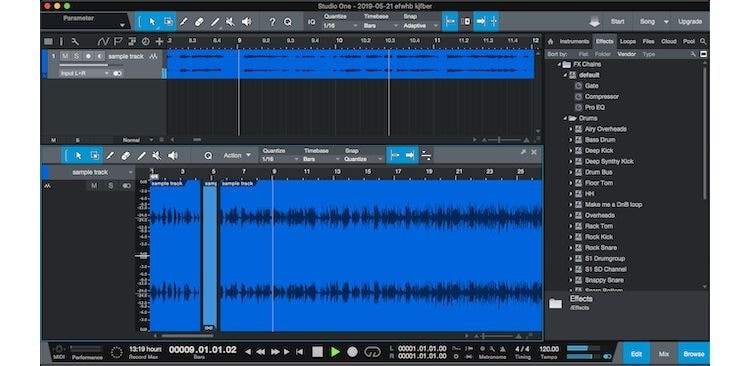
For those looking for a free MP3 music mixer for Mac, you shouldn’t look any further than PreSonus Studio One Prime. Although Studio One is a professional paid MP3 music mixer for Mac, the prime version is free and allows users to take advantage of its features without paying a dime. In addition, studio One Prime has built an impressive reputation as a capable and well-developed music mixer.
Although Studio One Prime doesn’t offer you the complete toolset available with this MP3 music mixer, it is still a functional package you can explore. This tool allows you to access audio tracks, FX channels, and MIDI tracks. It also offers you a host of effects, samples, and loops you can utilize to improve your MP3 music files. In addition to the instrument and drum editor it features, it will take your MP3 file to the next level. We also love its vast selection of cabs and guitar amps to improve the audio recordings.
When you opt for the paid version, you can access more features: the chord detector and the One XT sample. PreSonus Studio One Prime is a powerful and modern production tool that also allows you to automate tracks. You can also master the volume to your preference while monitoring the result through a different output. This is a non-destructive feature that most professional mixers look out for. In addition to MP3, Studio One Prime also supports a vast range of audio formats. Its intuitive interface is easy on the eye and just as easy to navigate. Although it can be challenging to master, it is the ultimate software for your MP3 music mixing.
Pros
- It is fully functional
- Allows you to master volume and automate audio tracks
- It comes with a non-destructive feature
- Intuitive interface for ease of use
Cons
- Not ideal for beginners
- The free version is limited
- The paid version is very expensive
Avid Pro Tools First
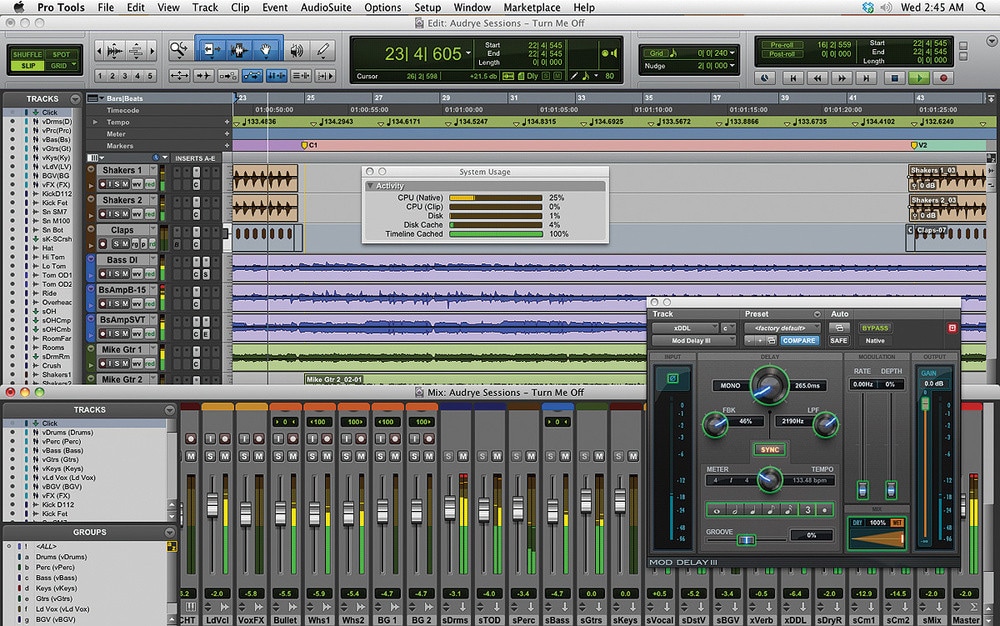
This tool provides you with industry-standard software for music production for Mac devices. The Avid Pro Tools First is the free version of the app and is an excellent option for new users to try out. This MP3 music mixer is rich in features but can be challenging to learn. Its complex interface might require some time to get used to but is useful when you want to mix MP3 music files.
This tool comes with many free plugins you can use to edit your audio file. It also features a library of royalty-free audio files and many more. Beyond excellent mixing support, this tool also supports multi-track recording. This MP3 music mixer also supports many audio formats beyond MP3 like OMF, CAF, MIDI, MP4, Plus AIFF, and many more. So if you want to try recording and to mix music files, this is one of the best sound mixing software for Mac.
Pros
- A vast range of pro-focused features
- Supports various audio formats
- This tool offers multi-track recording
- It is an industry-standard tool for audio mixing
Cons
- It comes with a steep learning curve
- The interface can be complex to navigate
Alternative Option: Wondershare Filmora
Wondershare Filmora is a unique MP3 music mixer that is ideal for the creative editing of your audio tracks. This audio mixing software features various audio-relative features like silence detection, audio synchronization, and audio ducking. Filmora also comes with royalty-free music you can utilize when mixing music. This feature allows you to blend multiple songs. Additionally, Wondershare Filmora has an Auto-beat sync feature that you can utilize for rhythm synchronization and quick song beats.
You can also edit the audio file by adding many unique features to the app. The audio visualizer allows users to mix and edit audio tracks. With a single click, you can transform speech into subtitle text conversion. When necessary, you can also sync video and audio files on Filmora. Its intuitive interface makes it relatively simple for beginners and experts to use. If you’re confused, you can always explore the tools and tutorials on the website.
Pros
- It allows for easy syncing of audio and video files
- Users have access to royalty-free music and plugins
- Offers an audio visualizer to edit and mix audio tracks
- Cloud storage is available on Wondershare Filmora
Cons
- The free trial doesn’t come with keyframing and speed ramping
Free Download For Win 7 or later(64-bit)
Free Download For macOS 10.14 or later
How to Mix MP3 Music with Wondershare Filmora
Filmora is one of the best MP3 music mixers available; it also comes with audio editing features. It is ideal for audio mixing due to features like silence detection and auto beat sync. It also features pitch and speed adjustments and a volume adjustment. You can also feature fading in and out of sounds. Below are the steps to mix MP3 music with Wondershare Filmora.
Step1First, download the app on your Mac device and install the Wondershare Filmora following the installation steps.
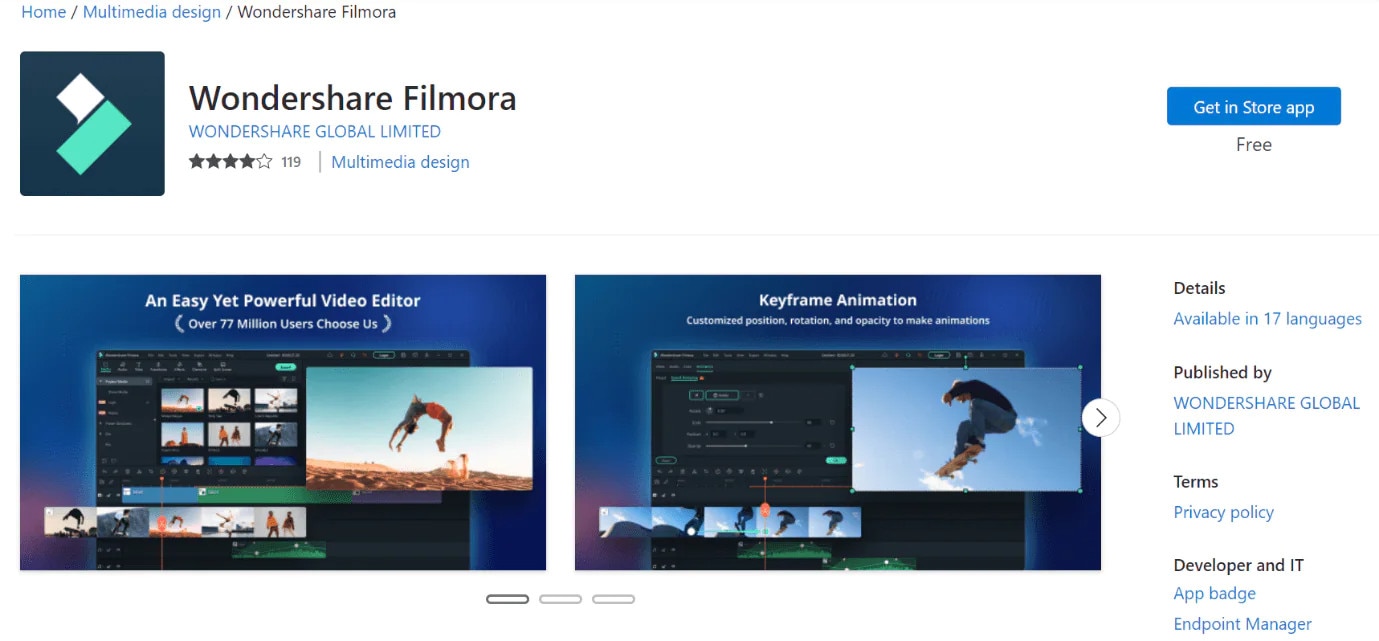
Step2Launch the app and hit the ‘create new project’ button to start.
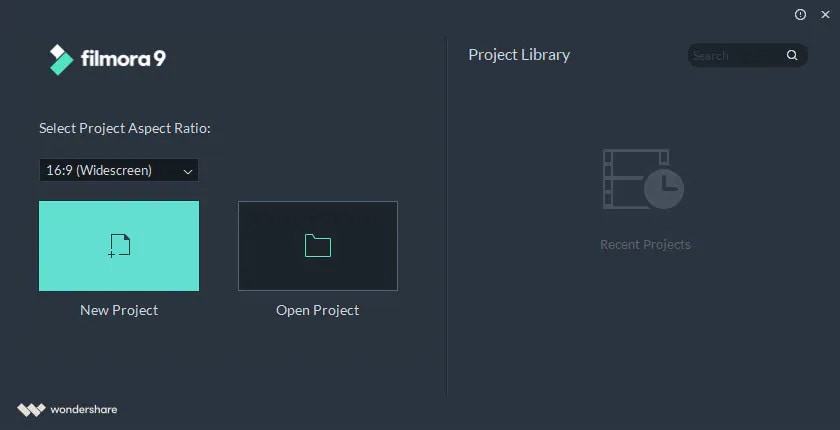
Step3On the editing panel; navigate to the media menu and click ‘import media files here’
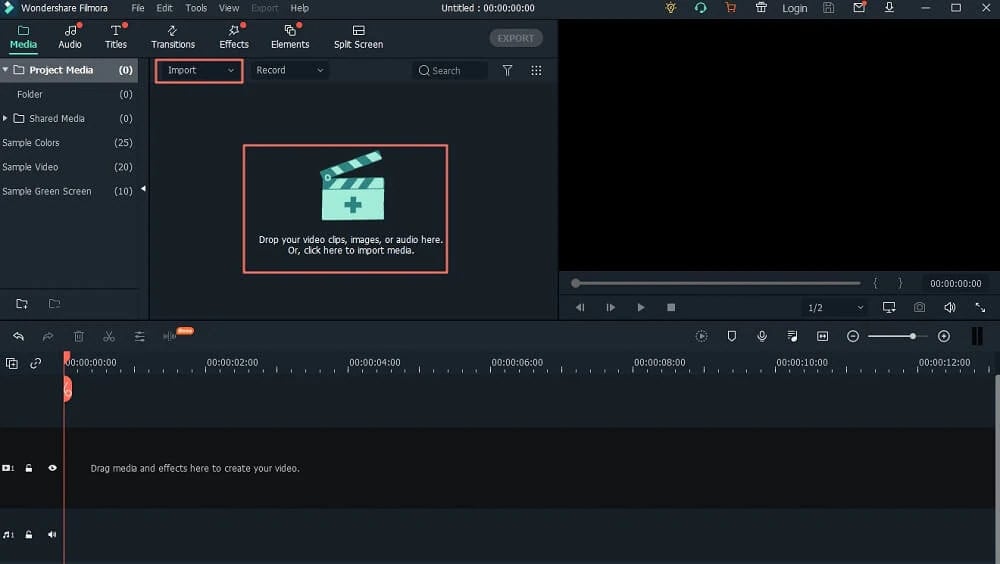
Step4Select the MP3 file and click the ‘import media’ button. You can also drag the file to the timeline instead.
Step5Start to mix your MP3 file by clicking the ‘audio mixer’ option and using the tools provided. You can also edit the audio and add effects and royalty-free music to your track.
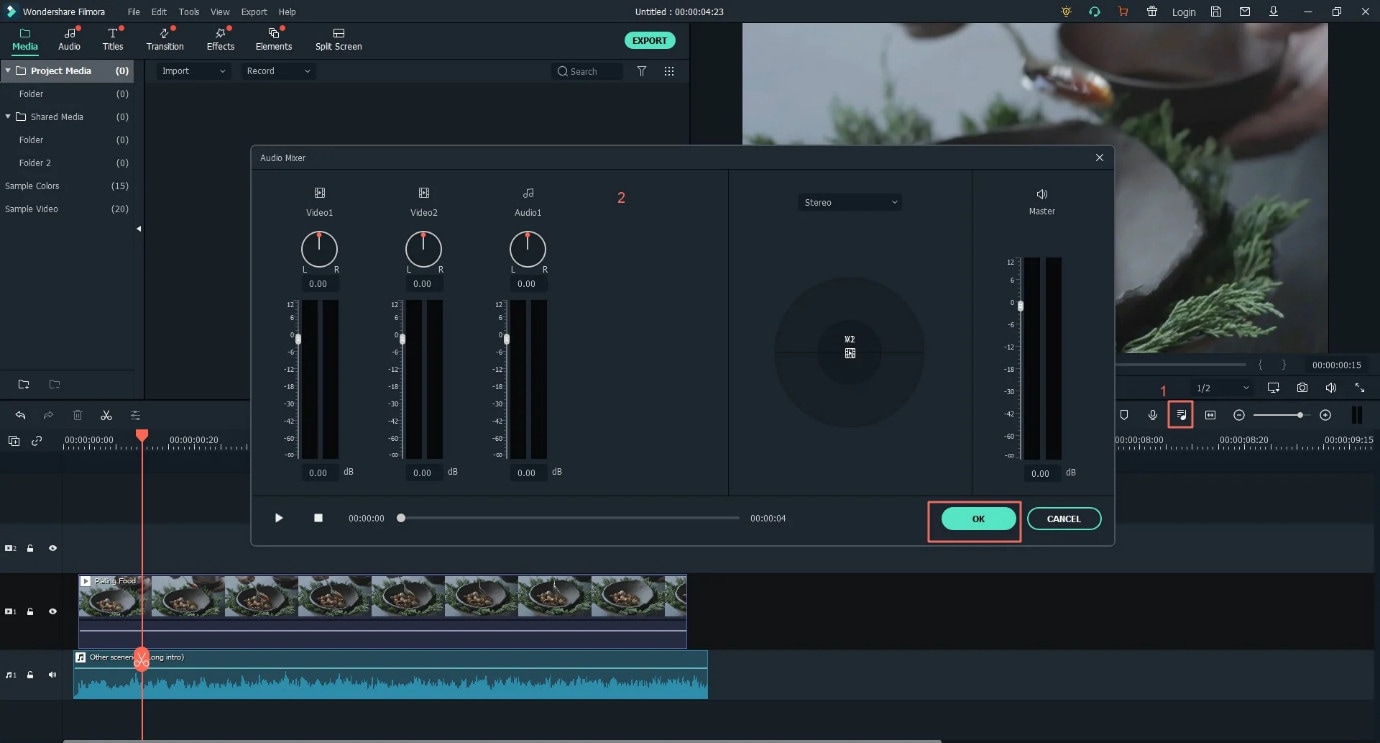
Step6After editing, click the ‘export’ button and edit the filename and location before saving. You can also share directly on social media platforms.
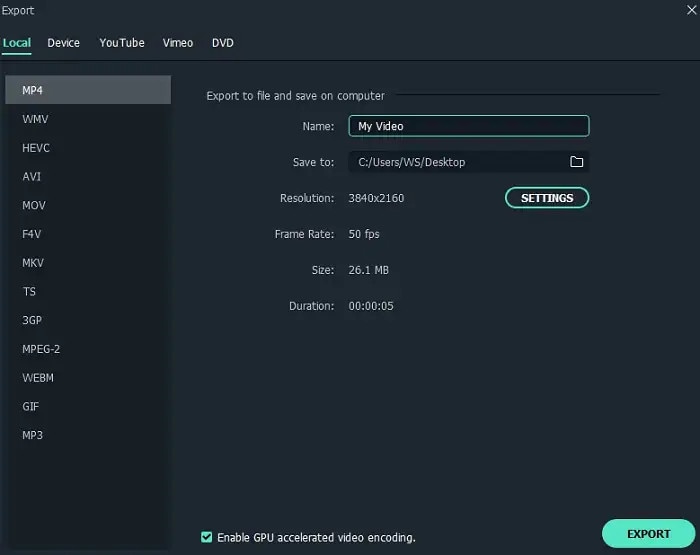
Final Thoughts
All the MP3 music mixers explored in this article are ideal for sound mixing. They offer you impressive audio-mixing and editing features. You can make unique sound mixes using the many functions available on this software. Most of the software explored in this article is free or has a free version you can utilize. By comparing these 5 best MP3 music mixers, you can easily find the best one for your needs.
Audacity

The first free MP3 music mixer for Mac that we have to consider is Audacity. Audacity is hard to miss because of how easy it is to use. Therefore, many people tend to recommend this software. Audacity is an open-sourced MP3 music mixer that’s entirely free to use. It has a straightforward and interactive user interface that supports the most popular file types, including MP3, WAV, OGG, MIDI, and many more.
With Audacity, you can record right in the app or edit existing files as you miss. It also comes with many effects that you can utilize to improve your MP3 file. Another unique tool on Audacity is the spectrogram that allows you to analyze the audio frequencies. Audacity supports up to 32-bit audio files making it a powerful MP3 music mixer for Mac users.
This MP3 music mixer is ideal for beginners as its features are easy to navigate. However, this doesn’t mean that professional DJs and sound producers cannot also utilize this audio mixer. You can record audio to add to your MP3 using a mixer or a live microphone. It also lets you download digital recordings from social media platforms like YouTube. This free MP3 music mixer for Mac is a great option to explore.
Pros
- It offers a spectrogram view to visualize frequencies
- It offers effects like Audio unity, which is specifically for Mac only
- Allows you to delete, cut, and merge clips
- It is entirely free to use
- Its keyboard shortcuts allow for a smooth workflow
Cons
- Crashes tend to happen
- It doesn’t support non-destructive editing
WavePad

This is another impressive Mac MP3 music mixer you can use for free if you’re doing non-commercial mixing. WavePad is remarkable because it supports many file types, so there’s no need to convert your MP3 to another format before mixing on WavePad. It also supports users working on multiple files simultaneously. This means you can process thousands of files at the same time while editing a file. In addition, WavePad offers a vast range of effects and supports audio bookmarking, which you would find very useful.
Other features these mixer offers are voice manipulation and text-to-speech functions. It is quite easy to use, making it an excellent option for beginners. Some of the effects people seem to love on this MP3 music mixer is the compression, noise removal, reverb, and many more. There’s also the analysis tool that advanced users can utilize to mix and edit their MP3 files.
With WavePad, speed and pitch changes are entirely possible. It also supports audio scrubbing, which is very handy. However, this file doesn’t support multi-tracking. Therefore, users can edit stereo or mono audio files on the software. Although its multi-window interface can take a while to get used to, this Mac MP3 music mixer is worth a try.
Pros
- It is free for non-commercial use
- It comes with many impressive features
- Allows batch processing by users
- Supports common file types
Cons
- The interface can take some time to get used to
Ocenaudio

Another free cross-platform MP3 music mixer is another excellent option for your Mac devices. It is a great option if you’re looking for a budget-friendly option to edit and mix your MP3 files. This software supports many file types like MP3, WMA, FLAC, and many more. It also supports video formats if you also want to edit video files.
This MP3 music mixer comes with a clean and colorful user interface; it is easy to use and fast for mixing your MP3 files. WavePad has many effects like EQ, compression, and reverb, allowing you to tweak your MP3 files while mixing your music files. Unlike other MP3 mixers that are destructive when you are trying to edit the MP3 music file, this is not the case with Ocenaudio. With this software, you can tweak the parameters of the effect and hear the changes immediately.
Ocenaudio also supports VST; you can add your plugins when editing MP3 files. In addition, you can record audio straight in the software and use the spectrogram feature to visualize frequencies for advanced users. Professional music mixers would find this feature to be very welcoming.
Although it doesn’t support multi-track sessions, which means you can’t record several instruments and mix them, it is an excellent option for your mono file mixing. It is also quite simple to use compared to other basic MP3 music mixers for Mac.
Pros
- It offers the spectrogram feature
- It is free to use
- Users can install their plugins
- Ocenaudio offers non-destructive music editing
Cons
- It doesn’t support multi-track sessions
- Not ideal for professionals
PreSonus Studio One Prime

For those looking for a free MP3 music mixer for Mac, you shouldn’t look any further than PreSonus Studio One Prime. Although Studio One is a professional paid MP3 music mixer for Mac, the prime version is free and allows users to take advantage of its features without paying a dime. In addition, studio One Prime has built an impressive reputation as a capable and well-developed music mixer.
Although Studio One Prime doesn’t offer you the complete toolset available with this MP3 music mixer, it is still a functional package you can explore. This tool allows you to access audio tracks, FX channels, and MIDI tracks. It also offers you a host of effects, samples, and loops you can utilize to improve your MP3 music files. In addition to the instrument and drum editor it features, it will take your MP3 file to the next level. We also love its vast selection of cabs and guitar amps to improve the audio recordings.
When you opt for the paid version, you can access more features: the chord detector and the One XT sample. PreSonus Studio One Prime is a powerful and modern production tool that also allows you to automate tracks. You can also master the volume to your preference while monitoring the result through a different output. This is a non-destructive feature that most professional mixers look out for. In addition to MP3, Studio One Prime also supports a vast range of audio formats. Its intuitive interface is easy on the eye and just as easy to navigate. Although it can be challenging to master, it is the ultimate software for your MP3 music mixing.
Pros
- It is fully functional
- Allows you to master volume and automate audio tracks
- It comes with a non-destructive feature
- Intuitive interface for ease of use
Cons
- Not ideal for beginners
- The free version is limited
- The paid version is very expensive
Avid Pro Tools First

This tool provides you with industry-standard software for music production for Mac devices. The Avid Pro Tools First is the free version of the app and is an excellent option for new users to try out. This MP3 music mixer is rich in features but can be challenging to learn. Its complex interface might require some time to get used to but is useful when you want to mix MP3 music files.
This tool comes with many free plugins you can use to edit your audio file. It also features a library of royalty-free audio files and many more. Beyond excellent mixing support, this tool also supports multi-track recording. This MP3 music mixer also supports many audio formats beyond MP3 like OMF, CAF, MIDI, MP4, Plus AIFF, and many more. So if you want to try recording and to mix music files, this is one of the best sound mixing software for Mac.
Pros
- A vast range of pro-focused features
- Supports various audio formats
- This tool offers multi-track recording
- It is an industry-standard tool for audio mixing
Cons
- It comes with a steep learning curve
- The interface can be complex to navigate
Alternative Option: Wondershare Filmora
Wondershare Filmora is a unique MP3 music mixer that is ideal for the creative editing of your audio tracks. This audio mixing software features various audio-relative features like silence detection, audio synchronization, and audio ducking. Filmora also comes with royalty-free music you can utilize when mixing music. This feature allows you to blend multiple songs. Additionally, Wondershare Filmora has an Auto-beat sync feature that you can utilize for rhythm synchronization and quick song beats.
You can also edit the audio file by adding many unique features to the app. The audio visualizer allows users to mix and edit audio tracks. With a single click, you can transform speech into subtitle text conversion. When necessary, you can also sync video and audio files on Filmora. Its intuitive interface makes it relatively simple for beginners and experts to use. If you’re confused, you can always explore the tools and tutorials on the website.
Pros
- It allows for easy syncing of audio and video files
- Users have access to royalty-free music and plugins
- Offers an audio visualizer to edit and mix audio tracks
- Cloud storage is available on Wondershare Filmora
Cons
- The free trial doesn’t come with keyframing and speed ramping
Free Download For Win 7 or later(64-bit)
Free Download For macOS 10.14 or later
How to Mix MP3 Music with Wondershare Filmora
Filmora is one of the best MP3 music mixers available; it also comes with audio editing features. It is ideal for audio mixing due to features like silence detection and auto beat sync. It also features pitch and speed adjustments and a volume adjustment. You can also feature fading in and out of sounds. Below are the steps to mix MP3 music with Wondershare Filmora.
Step1First, download the app on your Mac device and install the Wondershare Filmora following the installation steps.

Step2Launch the app and hit the ‘create new project’ button to start.

Step3On the editing panel; navigate to the media menu and click ‘import media files here’

Step4Select the MP3 file and click the ‘import media’ button. You can also drag the file to the timeline instead.
Step5Start to mix your MP3 file by clicking the ‘audio mixer’ option and using the tools provided. You can also edit the audio and add effects and royalty-free music to your track.

Step6After editing, click the ‘export’ button and edit the filename and location before saving. You can also share directly on social media platforms.

Final Thoughts
All the MP3 music mixers explored in this article are ideal for sound mixing. They offer you impressive audio-mixing and editing features. You can make unique sound mixes using the many functions available on this software. Most of the software explored in this article is free or has a free version you can utilize. By comparing these 5 best MP3 music mixers, you can easily find the best one for your needs.
Also read:
- Exploring the Pinnacle of Mac-Compatible Sound Engineering with These 5 Mixers
- New 2024 Approved Total Summary of Worldwide Podcast Repository Organizations
- Updated Top 3 Best MP3 Volume Boosters Online for 2024
- New Discover a World of Free Guitar Inspiration Imagery & Music Downloads
- New 2024 Approved Discover the Top 8 Studio Tools for Producers on Mac and Windows Systems
- Updated Transform Your Vocal Presence with Av Voice Changer Technology An Overview
- New A Spectrum of Screams The Best Places to Download Terrifying Tones Online
- Updated In 2024, Essential Dog Bark Samples for Audio Projects
- New In 2024, Unlocking New Dimensions in Communication Utilizing DiscoVoice on Discord Platforms
- Updated Resonant Praise Sound Composer
- New Mastering Audio Manipulation Adjusting Speed & Tone Over the Internet for 2024
- Updated Locating Recorded Sounds of Wolf Vocalizations
- In 2024, Navigating the Art of Selecting Top-Notch Sound Designers
- Updated Free Voice Creation Platforms Speak Your Text Now!
- Updated In 2024, How to Add Audio to MKV-2023 Update
- Expert Tips on Muting Audios From Visual Sources for Enhanced Focus
- New In 2024, Embarking on Editing Adventures with LexiEdit for Beginners
- Updated A Comprehensive Review of the Best Windows Speech to Text Programs for 2024
- Serene Editing Cutting Down on Audio Distractions Using Premiere Pros Latest Features
- New 2024 Approved Transforming Voices with Technology The Best Software to Watch Out For
- Where Can I Find Crowd Cheering Effect for 2024
- Updated In 2024, Revitalize Audio Diminishments in Video Presentation
- Updated Starting with iMovie Step-by-Step Guide to Incorporating Soundtracks for 2024
- New Identifying the Highest Rated 8 Vocal Transcription Systems Available on PCs & MACs
- In 2024, Precision Listening Top Audio Customization Techniques
- Exploring Excellence The Top 5 Audio/Visual Synthesis Machines
- New Enhancing Your Presentations with Audio PowerPoint Tips for Windows Users & Mac Owners for 2024
- Mastering Autotune A Step-by-Step Guide for Audacity Users
- 2024 Approved AudioMastery The Definitive Guide to Choosing the Best Voice Recorders
- New 2024 Approved Mastering Disguise on Skype Essential Voice Alteration Software Tools
- In 2024, Audio File Division Streamlined Strategies for Independent Sections of Sound
- New 2024 Approved Melody Mastery Made Simple The Top 10 Audio Recorder Devices for Swift and Hassle-Free Song Archiving
- New Elevate Video Audio Dynamics Increase Surround Impact
- New 7 Free Online Audio Trimmers to Trim Audio Easily for 2024
- Updated 2024 Approved Approaches to Silence Echoes in Professional Audio Recording
- In 2024, Integrating Volume Automation Into Win-Based Projects Using Adobe Premiere Pro
- Updated 2024 Approved Transforming Your Tech Experience How to Modify Siris Voice Across iDevices
- Updated Leading Audio Recording Apps Ranking the Best MP3 Recorders for PC & Mac Platforms
- New 2024 Approved Notable Sites to Download Popular Lofi Visuals and Audio Pieces
- Updated Vintage Vs. Modern Ranking Radio Sound Effects
- In 2024, Understanding the Basics of YouTubes Audio Archives
- New 2024 Approved Taming the Sound Waves with Audacity Seamless Setup and Removal Processes in Ubuntu
- Updated Innovative Sound Editing - Top 4 Applications Redefining Music Production on Mac for 2024
- Updated In 2024, Top 6 Android & iOS Apps for Enhancing Call Conversation Volume
- New Melody in Reverse Top 5 Nonlinear Audio Visuals From This Year for 2024
- New Sound Effects for Podcasts 11 Places to Find Them for 2024
- Updated 2024 Approved Vanguard Womans Phonetic Alteration Service Online - Free Edition
- New A Detailed Overview Whats New with Nero WaveEdit 2024 Edition
- In 2024, How To Get the Apple ID Verification Code On iPhone 15 in the Best Ways
- Updated 2024 Approved From Script to Screen Top 10 Movies Crafted with Final Cut Pro
- Updated How to Choose the Right Aiff Converter for Your Needs
- Updated In 2024, Easy Cartoon Characters Drawing Tutorials for You Who Are Learning to Draw
- How to Transfer Photos from Realme Narzo 60 5G to New Android? | Dr.fone
- Catch or Beat Sleeping Snorlax on Pokemon Go For Vivo X Flip | Dr.fone
- Bricked Your Vivo Y55s 5G (2023)? Heres A Full Solution | Dr.fone
- How to Rescue Lost Pictures from Realme 11X 5G?
- How to recover deleted contacts from Poco M6 Pro 5G.
- How to Perform Hard Reset on Oppo Find X6? | Dr.fone
- How To Unbrick a Dead Vivo V27 Pro | Dr.fone
- In 2024, A Step-by-Step Guide on Using ADB and Fastboot to Remove FRP Lock from your Xiaomi 13T
- Best Canva 10 Animated Templates for 2024
- In 2024, Here are Some of the Best Pokemon Discord Servers to Join On Oppo Reno 9A | Dr.fone
- How to Change Location on TikTok to See More Content On your Realme V30 | Dr.fone
- Whats Next After Movie Maker? Top 6 Windows Video Editors
- New 2024 Approved How to Animate Image on Scroll and Text on Scroll?
- Is pgsharp legal when you are playing pokemon On Xiaomi Redmi Note 12R? | Dr.fone
- New Unleash Your Creativity Best Stop Motion Software for Mac and PC
- In 2024, Bypass iCloud Activation Lock with IMEI Code From your iPhone 8
- New 2024 Approved The Most Accessible Video Editors
- A Working Guide For Pachirisu Pokemon Go Map On Tecno Spark Go (2023) | Dr.fone
- Popular Female & Male Disney Cartoon Characters
- How to Change Google Play Location On Vivo Y100i Power 5G | Dr.fone
- In 2024, Is pgsharp legal when you are playing pokemon On Vivo S17t? | Dr.fone
- In 2024, Forgot iPhone Passcode Again? Unlock iPhone 13 mini Without Passcode Now | Dr.fone
- How to Downgrade iPhone 6 without Losing Data? | Dr.fone
- New Replace Sony Vegas Discover the Best Video Editing Software for Windows
- In 2024, 8 Best Apps for Screen Mirroring Vivo V29e PC | Dr.fone
- How To Unlock Any Xiaomi Redmi Note 13 5G Phone Password Using Emergency Call
- Full Solutions to Fix Error Code 920 In Google Play on OnePlus Ace 2 | Dr.fone
- Fixing Foneazy MockGo Not Working On Vivo Y100i | Dr.fone
- New The Ultimate FCP X Shortcut Adding Effects in 3 Simple Steps for 2024
- Hacks to do pokemon go trainer battles For Apple iPhone XS | Dr.fone
- How To Change Your SIM PIN Code on Your Realme Narzo N55 Phone
- Updated If You Want to Know How to Live Stream Pre-Recorded Video, You Are in the Right Place. We Will Give You a Complete Guide on 8 Ways You Can Live Stream Pre-Recorded Videos Successfully
- How to Unlock iPhone SE (2020) Passcode without iTunes without Knowing Passcode? | Dr.fone
- Title: New The Ultimate Guide to Essential Sound Processing Techniques for Modern Music Production
- Author: Jacob
- Created at : 2024-05-05 03:39:28
- Updated at : 2024-05-06 03:39:28
- Link: https://audio-shaping.techidaily.com/new-the-ultimate-guide-to-essential-sound-processing-techniques-for-modern-music-production/
- License: This work is licensed under CC BY-NC-SA 4.0.



